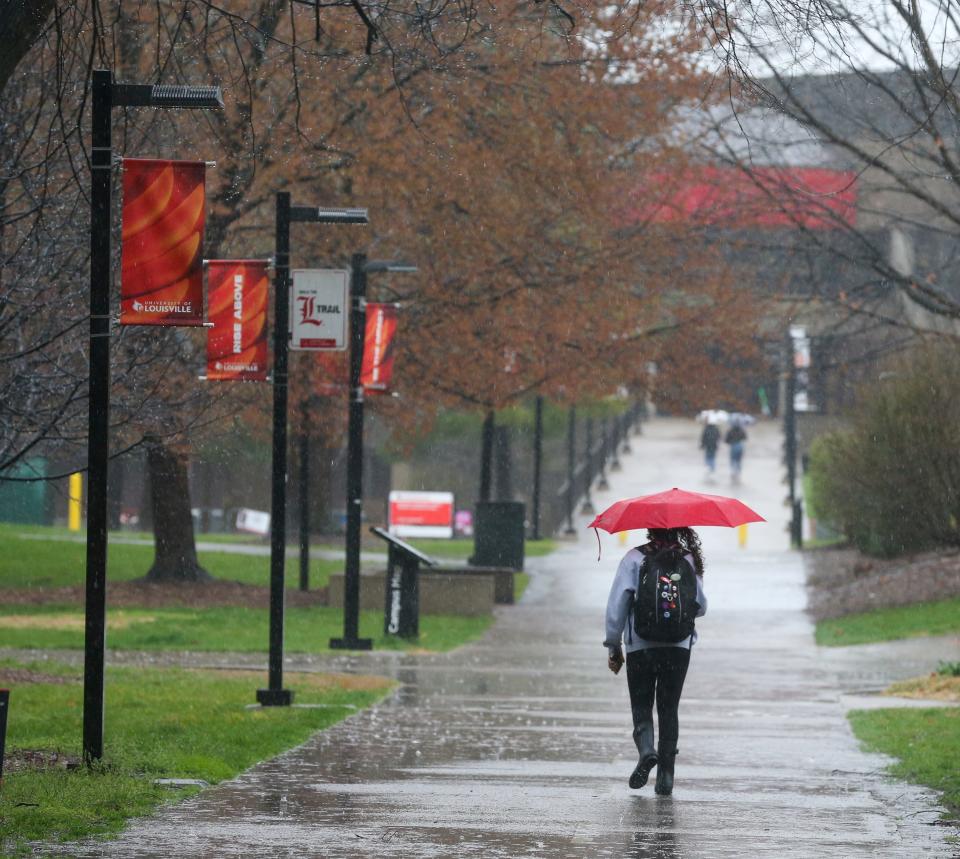I'm a senior at U of L. Kentucky's anti-DEI bills would hurt Black students like me.
The University of Louisville’s student body is at least 14% Black. It is a rare example of a White institution that places some emphasis on the recruitment and matriculation of Afro-American students. So much so that the percentage of Black students at Louisville outpaces our overall population in the state (8%), although it still falls behind the proportion of Black people in Louisville (25%).
This robust presence of Black students at U of L is not incidental or accidental, it is the result of purposeful policies that seek to address a history of racism perpetrated by the university and our society. The Woodford R. Porter Scholarship, a program for Black students, was created by U of L in 1984 in response to a court decision that found the university was still engaging in segregation—20 years after the Civil Rights Act became law.
DEI programs work to correct centuries of racial oppression
In the decades since this step, efforts to diversify higher education gained popularity across the nation. Today, universities compete to show how welcoming they are to people of all backgrounds: These efforts have come to be known as Diversity, Equity and Inclusion and they cut across all boundaries of race, sex, gender, class, etc. In other words, the fruits of the Black Civil Rights Movement have been expanded—and diluted—to benefit all types of people.
More initiatives followed the implementation of the Porter scholarship at U of L. The MLK Jr. Scholars program offers scholarships and career development to high-achieving Black and Latino students. Louisville’s campus also features one of the most vibrant Cultural Centers in the country. This is a hub where all students can spend time in an environment where their backgrounds are accepted, cultural student organizations can meet and they can engage with critical resources designed to help them succeed in school and life. All these programs were designed to attract Black students and offer us personal and professional support that enables us to graduate and get a good start in life.
Ricky Jones: U of L is a coward for removing 'diversity' positions. Black students should make them pay.
I know this because without these programs I would not be here, and I would not have made it this far since I got here. I’m currently a senior at U of L—a Martin Luther King and Woodford R. Porter Scholar. I’m a first-generation college student, like most Black students are, who would’ve gotten lost in the bureaucracy and isolation of college long ago without the support given by the people who operate these programs. More importantly, I’ve received the opportunity to learn about the history of my people and to serve them and advocate for them. Without the MLK Scholars program, I would’ve never learned about Decode Project, an organization I’ve worked with since my freshman year to teach Black kids how to read. I also never would’ve met the passionate scholars with whom I advocated for the restoration of the right to vote to the formerly incarcerated in our state.

Anti-DEI legislation hurts students like me
Thousands of stories like mine will be made impossible if we allow the proposed “anti-DEI” legislation—Senate Bill 6 and especially House Bill 9—to become law in Kentucky. Black students who are making a tangible impact on their communities will be robbed of the network that makes that possible. Black students who have the capacity but lack the resources to be leaders in their community will be robbed of the opportunity to sharpen and specialize their capacity. The impact of these bills won’t only affect Black students either. Every student on this campus will receive a diminished education if the Black population is allowed to atrophy. The overall culture of this school will lose essential elements of its diverse vibrancy.
While the limited space allowed me in this forum precludes me from outlining exactly how ridiculous these bills are, let’s examine one example that illustrates their nature. A clause in HB 9 defines a “discriminatory concept” as, “presenting as truth, rather than as a subject for inquiry, that an existing structure, system, or relation of power, privilege, or subordination persists on the basis of oppression, colonialism, socioeconomic status, or… race.”
Ignoring this country's sordid past does not help it's future
Was this country not significantly built on the forced labor of dehumanized African slaves? Were those same people not denied their citizenship rights until only sixty years ago on the basis of their race? Does recent history have no effect on the current condition of a people? Can’t these important societal subjects possess elements of historical fact and still be subjects of inquiry? Is it discriminatory to study the history of discrimination?
Ricky Jones: Has KY become a punchline? GOP's regressive bills aren't just embarrassing. They're bad.
These are the questions raised by only one small paragraph of a thirty page bill. We can not allow these ignorant and destructive bills to become law.
If they do, the universities of this state must take all legal means to challenge these laws in the courts and resist their implementation on campus. They say they are committed to diversity and academic freedom: now is their opportunity to prove it. As for Black people, it is time for us to have a serious discussion about supporting and building our own institutions. It is abundantly clear that even minimal gains are only tenuous in institutions we don’t control. Any manifestation of Black Power, even masqueraded as multiculturalism, will be targeted and eliminated.

Nino Owens, Financial Director of the Kentucky Students for Criminal Justice Reform at the University of Louisville.
This article originally appeared on Louisville Courier Journal: What is DEI? Kentucky bills hurt Black students like me
Solve the daily Crossword

